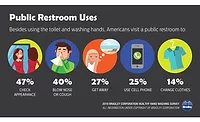Survey: Pleasant restrooms draw return customers
Bradley Corp. releases 2017 Healthy Hand Washing Survey

A new survey shows how businesses ultimately pay a price for having unpleasant restroom conditions — and reap the rewards of providing good ones.
Fifty-six percent of American adults said they are unlikely to return to a business after experiencing unpleasant restrooms, according to the Healthy Hand Washing Survey by Bradley Corp. Other disheartened customers will complain to management, tell a friend, post a comment on social media or leave right away without completing their business.
Conversely, businesses that have pleasant, well-maintained restrooms can turn into customer magnets. 70% of Americans say they have made a conscious effort to select a specific business because it has restrooms that are cleaner and better maintained. That number is even higher for millennials — 77% of respondents aged 18-34 say they’ve patronized certain businesses because they have cleaner restrooms.
“Depending on their condition, public restrooms can become significant business liabilities — or ringing endorsements,” said Jon Dommisse, director of global marketing and strategic development at Bradley Corp., a manufacturer of commercial washroom products. “Good restrooms clearly give businesses a competitive edge.
“For eight years, our survey has shown how letting restroom maintenance slip through the cracks can have a substantial negative impact — ultimately, lost business. Now, in contrast, we see that decent restrooms invite positive customer reinforcement and likely attract more sales.”
Moreover, expectations for a business’ restrooms are clearly tied to customers’ perceptions of the quality of the goods or services. According to the survey, 92% expect that a business that provides high quality products or services would also have restrooms that deliver a high quality experience.
Despite the high value that customers put on restroom conditions, the survey also uncovered an adverse trend showing that more businesses are at an increased risk for losing customers due to messy facilities. In 2017 almost 70% of Americans said they recall having an unpleasant restroom experience — that number was only 60% in 2015.
Dommisse said that keeping regular scheduled maintenance on the radar is essential, citing the following common restroom aggravations uncovered by the survey: empty or jammed toilet paper dispensers (mentioned by 93% of respondents); clogged or unflushed toilets (87%); stall doors that don’t latch (81%); bad smells (79%); and an overall appearance that’s old, dirty or unkempt (79%).
Further, Americans don’t like touching things in public restrooms and they use all sorts of techniques to avoid coming into contact with surfaces like relying on their foot to operate the toilet flusher, using a paper towel to grasp the door handle and hovering over the toilet seat.
When asked what restroom improvements they’d like to see, it’s not surprising that cleanliness topped the list. After that, Americans want touchless fixtures and better stocking of supplies, such as toilet paper, soap and paper towels.
The annual survey queried 1,042 American adults online Dec. 12-15, 2016 about their hand washing habits in public restrooms and concerns about germs, colds and the flu. Participants were from around the country, were 18 years and older, and were fairly evenly split between men and women (49 and 51 percent).
For more information and infographics on research results, visit www.bradleycorp.com/handwashing.
Follow Plumbing & Mechanical on LinkedIn, Twitter, Facebook and YouTube
Looking for a reprint of this article?
From high-res PDFs to custom plaques, order your copy today!










